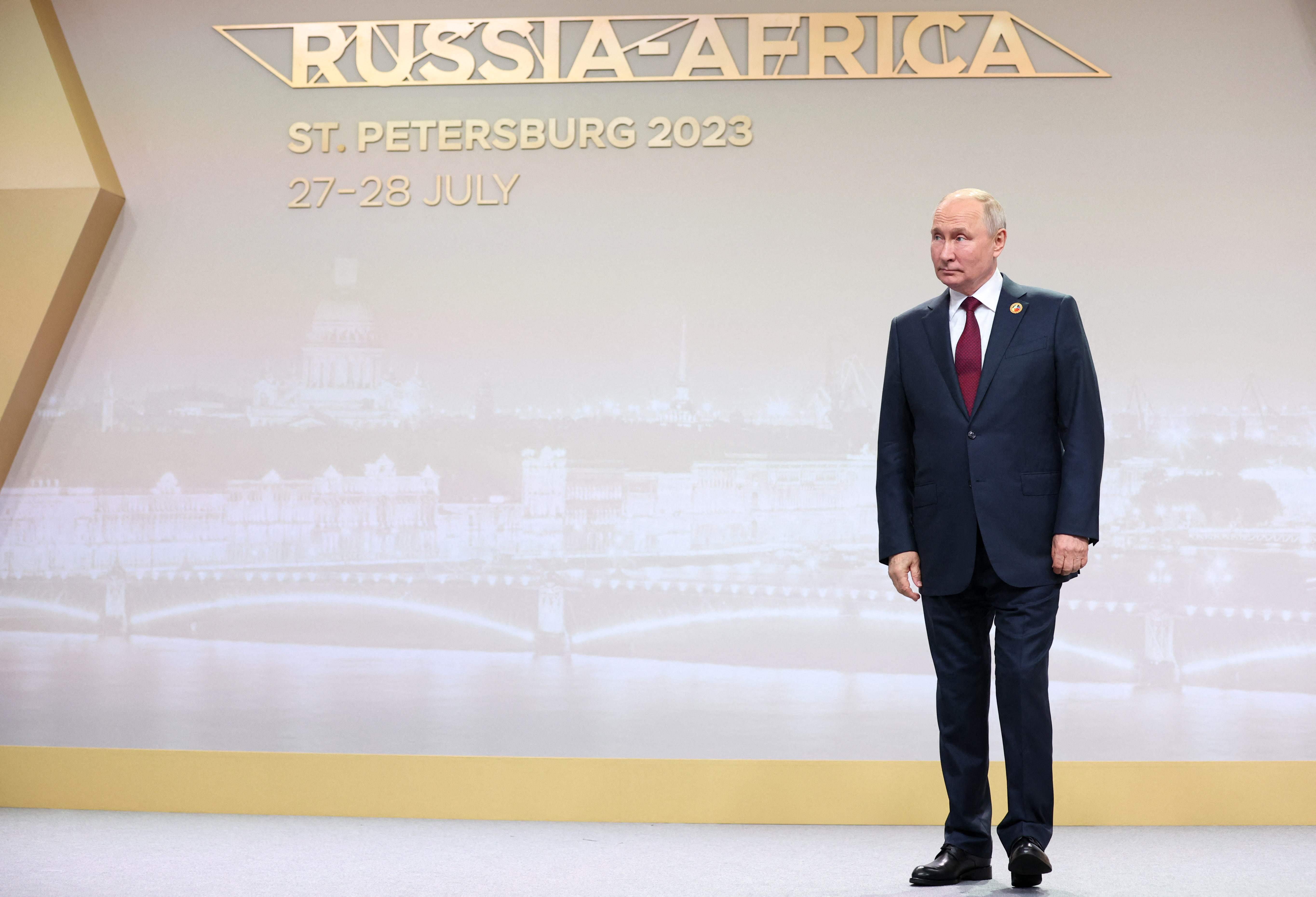3.4
Second Russia-Africa Summit
The 2023 Russia-Africa Summit, envisioned as a festival of anti-Western rhetoric, ended up attracting fewer participants than Russia had hoped.
The event faced challenges from its inception, as the Russians were battling scepticism from African partners and financial problems.
The summit did not signify the beginning of a new era or a great leap in Russia-Africa relations.
In July 2023, St Petersburg hosted the second Russia-Africa Summit. This crucial event, pivotal for Russia’s efforts to solidify ties of friendship and cooperation with African countries, fell short of expectations. Only 17 African leaders attended – in stark contrast to the 43 heads of state present in 2019. Russia blamed this decline on intense and adversarial Western pressure and strived to depict the event as a success regardless. A deeper examination, however, uncovers the challenges Russia faced from the early stages of organising the event, rendering it less than a triumph.
Preparation began in the Russian Ministry of Foreign Affairs in late 2022 with a distinctly anti-Western tone. Publicised as an economic and humanitarian forum, the summit’s actual intent was politically driven: to sway African countries to embrace Russian narratives and demonise the West. The primary theme revolved around fighting alleged Western neocolonialism, and the issue of food security was highlighted. Recognising the geopolitical landscape, Russia knew it couldn’t afford a failure. Ensuring maximum participation from numerous African nations was crucial, and Russian agencies worked tirelessly to this end.
Yet, the endeavour was fraught with difficulties. Russian officials continuously confronted scepticism from African representatives. The lack of African voices in setting the agenda and dissatisfaction with Russian official communication were major points of contention. Doubts over Russia’s reliability emerged, especially regarding promises of private meetings to all attending heads of state with President Putin, which had already gone unfulfilled in 2019. Accusations that Russia viewed Africa as a monolith, ignoring regional nuances, were also voiced.
Russia could not wholly ignore these African concerns. The Foreign Ministry organised regular briefings on the summit’s progress to help with communication. Formal written assurances for private meetings with Putin were dispatched. The draft summit declarations included more Africa-centric topics than 2019 and were sent to African nations for early feedback. Russia also pledged to cover the travel and accommodation costs for the heads of state and five delegation members from each country, and a charter flight to Russia was arranged from Addis Ababa.
Despite the facade of consideration, promises and generous offers, Russia’s approach remained fundamentally the same. While African feedback was solicited on the draft declarations, Russia largely ignored their suggestions, focusing instead on the illusion of inclusion. The generous promises to cover accommodation and transportation costs also proved somewhat unreliable. In the early summer of 2023, the officials organising the event were instructed to reduce expenses, leading to cuts in the hospitality package. This financial shortfall impacted the event itself, where there were not enough vehicles for the delegations, causing some attendees from Africa to remain confined to their hotels, and even basic supplies like stationery were subject to strict limits.

Putin mostly stood alone during this day of anti-Western agitation. The Russia-Africa Summit did not mark a new chapter or a major advancement in bilateral relations.
Source: Sergei Bobylyov / AFP Photo
Amidst organisational uncertainties, many African countries delayed confirming their delegations, leaving Russian organisers in limbo about attendance until just weeks before the summit.
Amid these challenges, many African countries delayed confirming their delegations and participation, leaving Russian organisers in limbo about attendance until just weeks before the summit. Ultimately, the event saw limited participation from heads of state. President Putin mainly had the chance to greet leaders from countries already distanced from the West and under Russia’s sphere of influence, such as Eritrea, the Central African Republic and Mali, along with Soviet-era allies like Zimbabwe, and nations maintaining diverse foreign policies, like South Africa and Egypt, which balance their relations with both Russia and the West, without their attendance necessarily indicating a choice of sides. The outcome was less than satisfactory for Russia, aiming to assert its position against the West and validate its role as a credible partner and friend to Africa. The summit did not mark a new era or a significant leap in Russia-Africa relations. Russia has set its sights on a renewed attempt in 2026.
THE ELEPHANT IN THE ROOM
The Russia-Africa Summit symbolises the apex of their collaborative efforts, yet numerous undertakings occur more subtly, away from the public eye. A case in point is Russia’s intent to acquire elephants from Chad for its state circus, Rosgostsirk. Given the amicable bilateral ties, Chad has shown interest in this animal trade. Seems straightforward enough: Russia wants elephants, Chad has them. A deal is struck, and everyone is happy.
However, the situation is more nuanced. Chad’s elephants are confined to Zakouma National Park, a highly protected area where considerable efforts have been invested over the past decade to replenish the elephant population. What’s more, both nations are signatories to the 1973 Washington Convention, commonly known as CITES – the United Nations agreement regulating international trade in endangered species. CITES explicitly prohibits the commercial trade of wild-caught African elephants. Despite these constraints, both countries are determined to reach a favourable resolution. The proposed workaround is to transfer the elephants to Russia under the pretext of scientific research.
Russia’s indifference to elephant conservation and wildlife preservation more broadly is, perhaps, not surprising, yet it persistently advocates that all nations should adhere to United Nations regulations. The elephant deal starkly illustrates this as mere rhetoric. Russia’s adherence to international regulations, including those set by the UN, is selective and self-serving. When such conventions hinder Russian interests, they offer no sanctuary. This disregard seems to hold true as much in human affairs as it does in the realm of wildlife conservation.